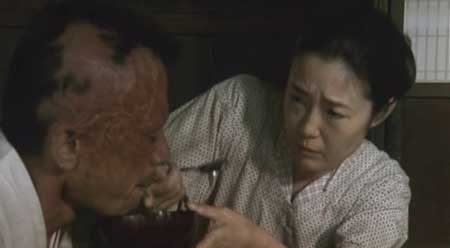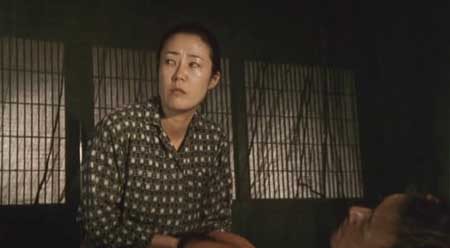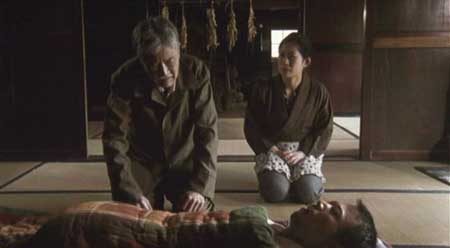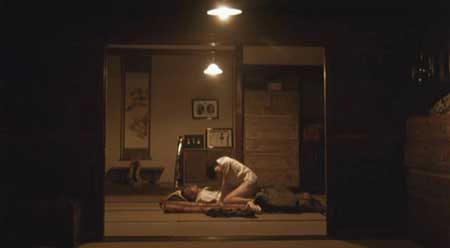SYNOPSIS:
During the Second Sino-Japanese War, in 1940, Lieutenant Kurokawa returns home as a honored and decorated soldier… but deprived of his arms and legs lost in battle in mainland China. All hopes, from the village men and women to close family members, turn to Shigeko, the Lieutenant’s wife: she must honor the Emperor and the country in setting an example for all by fulfilling her duty and taking care of the ‘god soldier’…
REVIEW:
The 2010 film, Caterpillar, is a movie about World War II, a topic we as American film audiences have seen covered a great many times throughout the years. But this story brings us a different perspective than most of us are probably used to – this is not the story of the heroic American troops battling the evils of Hitler and the Nazis, but rather the story of someone on a different side, a wounded Japanese soldier returning home from battle in China. And while the local village celebrates the return of a decorated war hero in Lieutenant Kurokawa (played by Keigo Kasuya), his wife (Shigeko, played by Shinobu Terajima) is left with the daunting task of trying to live up to her new role as caretaker of the supposed “war god,” a man who has returned from battle with severe burns, no arms, no legs, and little ability to communicate.
Caterpillar is written by Hisako Kurosawa and Masao Adachi and was one of the last films directed by the late Koji Wakamatsu (he passed away in 2012 with a resume of over 100 films directed, including exploitation gems such as Violated Angels, Go, Go, Second Time Virgin, and The Embryo Hunts in Secret). Right away it reminded me a lot of another controversial war story, the novel turned movie Johnny Got His Gun (the novel written by, and later the movie also directed by, Dalton Trumbo). In that story, we have an American war veteran who has lost not only his arms and legs, but also most of his senses, and is confined to a hospital bed, and we feel for him as we hear his thoughts and confusion and relive with him his memories of being wounded on the battlefield. Here, however, the wounded veteran is coherent and returned to his ill-equipped home with his ill-prepared wife after being injured in a less-than-heroic situation. And even worse for Shigeko, while everyone on the outside sees him as a hero, it turns out he is still the same abusive, controlling jerk he was before he went away to war.
There are few movies that come close to being as blatantly anti-war as Caterpillar. We have a man who the government has used as much as they could and now washed their hands of, decorating him with medals as if that makes him whole again. We see how the war destroys the home, not just for the man who now has to rely on someone else in order to eat, to bathe, to go to the bathroom, but also the wife who will forever be expected to keep up appearances and be strong for the empire. And how is she repaid for her selflessness, for her dedication to her injured husband? No, there is no gratitude or thank yous; she gets spit on and berated and, if the “war god” is in a good mood, used for sex.
Wakamatsu’s film is not an action-packed one, and those looking only for battle scenes and war tension will be better off looking elsewhere. Instead, Caterpillar delves into the dark and conflicted emotions of this small family, becoming at times a little bit repetitive in order to hammer home what their life is now like. The way the film is set up, the audience can’t help but feel distrust and anger toward the crippled war veteran and compassion for the wife – let’s face it, there are lots of stories of heroes returning from battle, but this is not one of them. No, this film tells the story of a broken soldier and how hard life can be after facing the hell of war.
Kasuya is good in the role of the injured lieutenant, for sure, but I think the star of the film is Shinobu Terajima as Shigeko. We follow her on her decline as she starts off hopeful, then becomes instantly horrified when she sees the condition her husband has returned in, and from there she slowly crumbles and falls apart. We believe her as the obedient wife, trying her best to do what has been asked of her, but finding the whole ordeal much more than any one person should be asked to put up with. This is a powerful film, one that will no doubt provoke conversation and deep thoughts about the realities of war and what happens once the soldiers come home.
 Horror News | HNN Official Site | Horror Movies,Trailers, Reviews
Horror News | HNN Official Site | Horror Movies,Trailers, Reviews















